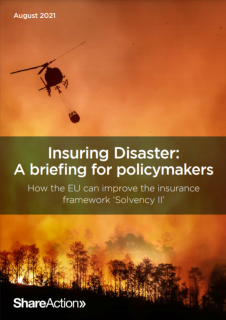
“Code red for humanity” is how UN Secretary-General António Guterres described the conclusions by the Intergovernmental Panel on Climate Change (IPCC) about the state of the Earth’s climate. His words reflected not just academic predictions of the future, but also the reality of increasingly frequent and intense extreme weather events. Indeed, the list of deadly heatwaves and destructive floods in 2021 has been startling.
Insurers are directly impacted by these events; their losses to cover the damage caused by natural disasters were higher for the first half of 2021 than for any six month period since 2011. Insurers also have a vital role to play in helping communities and economies become low-carbon, climate-resilient and sustainable.
The upcoming 2021 review of the Solvency II legislation for insurance firms offers the EU a vital opportunity to build this landscape by mandating that insurers consider sustainability risks in their investing and underwriting activities. This briefing seeks to:
- show that current EU insurance regulation does not adequately integrate sustainability considerations
- highlight the important role that insurers play in supporting a transition to a sustainable economy
- explain why incorporating environmental, social and governance (ESG) considerations contributes to the stability of the insurance industry
- provide concrete recommendations on how Solvency II can better integrate sustainability in its governance, disclosure, and prudential (risk) provisions.
